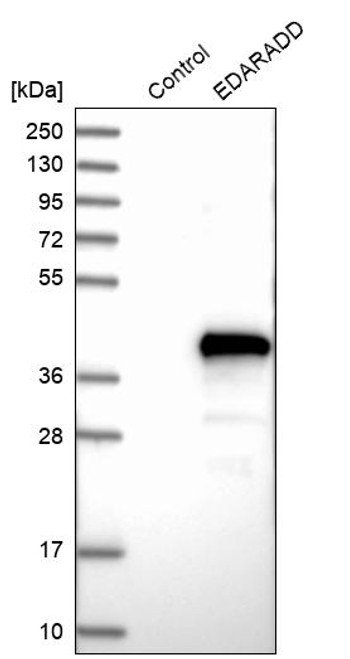Anti EDARADD pAb (ATL-HPA018836 w/enhanced validation)
Atlas Antibodies
- Catalog No.:
- ATL-HPA018836-25
- Shipping:
- Calculated at Checkout
$324.00
Gene Name: EDARADD
Alternative Gene Name:
Isotype: IgG
Interspecies mouse/rat: ENSMUSG00000095105: 91%, ENSRNOG00000002624: 91%
Entrez Gene ID: 128178
Uniprot ID: Q8WWZ3
Buffer: 40% glycerol and PBS (pH 7.2). 0.02% sodium azide is added as preservative.
Storage Temperature: Store at +4°C for short term storage. Long time storage is recommended at -20°C.
| Product Specifications | |
| Application | WB, IHC |
| Reactivity | Human |
| Clonality | Polyclonal |
| Host | Rabbit |
| Immunogen | PTISDLLNDQDLLDVIRIKLDPCHPTVKNWRNFASKWGMSYDELCFLEQRPQSPTLEFLLRNSQRTVGQLMELCRLYHRADVEKVLRRWVDEEWPKRERGDP |
| Gene Sequence | PTISDLLNDQDLLDVIRIKLDPCHPTVKNWRNFASKWGMSYDELCFLEQRPQSPTLEFLLRNSQRTVGQLMELCRLYHRADVEKVLRRWVDEEWPKRERGDP |
| Gene ID - Mouse | ENSMUSG00000095105 |
| Gene ID - Rat | ENSRNOG00000002624 |
| Buffer | 40% glycerol and PBS (pH 7.2). 0.02% sodium azide is added as preservative. |
| Documents & Links for Anti EDARADD pAb (ATL-HPA018836 w/enhanced validation) | |
| Datasheet | Anti EDARADD pAb (ATL-HPA018836 w/enhanced validation) Datasheet (External Link) |
| Vendor Page | Anti EDARADD pAb (ATL-HPA018836 w/enhanced validation) at Atlas Antibodies |
| Documents & Links for Anti EDARADD pAb (ATL-HPA018836 w/enhanced validation) | |
| Datasheet | Anti EDARADD pAb (ATL-HPA018836 w/enhanced validation) Datasheet (External Link) |
| Vendor Page | Anti EDARADD pAb (ATL-HPA018836 w/enhanced validation) |
| Citations for Anti EDARADD pAb (ATL-HPA018836 w/enhanced validation) – 1 Found |
| Lawrence, Mitchell G; Pidsley, Ruth; Niranjan, Birunthi; Papargiris, Melissa; Pereira, Brooke A; Richards, Michelle; Teng, Linda; Norden, Sam; Ryan, Andrew; Frydenberg, Mark; Stirzaker, Clare; Taylor, Renea A; Risbridger, Gail P; Clark, Susan J. Alterations in the methylome of the stromal tumour microenvironment signal the presence and severity of prostate cancer. Clinical Epigenetics. 2020;12(1):48. PubMed |



